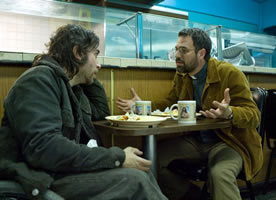Mark Ruffalo's "Sympathy for Delicious" Remarks on Faith Healing

A prized entry at the Sundance Film Festival, Sympathy for Delicious is a new indie film that's garnering some attention. In his directorial debut, Mark Ruffalo (who also acts in the film) tells an acute story based on a screenplay by his longtime friend, actor Christopher Thornton, about a paralyzed DJ who has the power to heal everyone, except himself.
The religious-toned film comes from Thornton’s personal experience having broken his back in a rock climbing accident. Thornton (who also acts in the lead role) and Ruffalo’s cinematic commentary about faith, healing, and selfish versus selfless acts is thought-provoking. What the film inherently asks, on a very personal level, is, what are we doing with the gifts we’ve been given?
Ruffalo and Thornton's Take on Healing
In a video interview, Mark Ruffalo, who doesn't believe in faith healings, explains that Sympathy for Delicious is an allegory about selfless giving through the exigent journey of DJ “Delicious” Dean O’Dwyer.
Pointing out how commercialized our society has become, Ruffalo says, “We all have what Dean has – the ability to give. And we have the ability to give without receiving anything in return.”
Though many scenes hit a spiritually reflective note, one in particular strikes a chord with me. The scene shows Dean talking with two priests about his ability to heal and yet not be able to heal his own paralysis. Ruffalo, who was raised Catholic, understands how faith is disrupted by tragedy.
“That’s what suffering is – where rubber hits the road as far as faith goes,” he says. “The story is, you get what you need, not what you want.”
Sympathy for Delicious does not explicitly assert that Christ is the answer to hope and healing. However, the movie does show that even though Dean desperately wanted his body healed, he discovers that perhaps his soul needed healing first – a takeaway that has garnered positive responses from young Christians, according to Thornton.
Believers often ask: Why do some experience healing and others do not? For skeptics, the question is: Do healings really happen or is it all fake? The latter is one Thornton has asked within himself. Out of “desperation”, he went to faith healings after a rock-climbing accident broke his back. He arrived at the services paralyzed and left the same, resulting in his rejection of the “faith healing” system.
A Faithful Response to Sympathy for Delicious
As a person of faith, I absorbed Sympathy for Delicious in perhaps a different light than others. I saw his internal struggle with doubt as the journey most take before realizing the reality of God. My own path has me grounded in the truth of God's power – to save and to heal. Historical evidence found in Scripture point to this fact: the blind healed and the lame made to walk (Matthew 21), lepers cleansed (Matthew 8), the woman with the issue of blood (Matthew 9).
The accounts of the Holy Bible and modern-day amazing stories are not the only confirmations I have of God's healing power. What convinces me is the healing I have personally experienced. At a young age, I was prayed for, not by a “faith healer” as depicted in the opening scene of Sympathy for Delicious, but a faithful man of God. Seemingly destined for a life riddled with the complications of childhood diabetes, the missionary asked God to heal my three-year-old body. And He did. Tests came back negative for the disease.
On the other hand, the prayers I have offered on behalf of my father's medical condition have not - yet - been fully answered. Regardless of what I see now, my faith confirms that his future healing is assured - as promised by the beatings Christ suffered before hanging on the Cross (I Peter 2:24). That hope is what intrigues me about one of the characters in the film, who though he's disabled, has a steady faith no matter his physical circumstance. It's his faith that appeals and hopeful moviegoers will pick up on.
The effective, fervent prayer of a righteous man avails much. (James 5:16)
The eyes of the Lord are on the righteous and his ears are attentive to their cry. (Psalm 34:15)
On another level, Ruffalo and Thornton's project touches on the responsibility we have to help those around us. In the film, Dean is torn between using his gift of healing to minister to his fellow homeless and locals or using it to gain fame and fortune as a part of rock band who touts his “tricks” for concert revenue. On this point, it's agreed. Misusing God's gifts for personal gain is disgraceful.
In his grace, God has given us different gifts for doing certain things well. So if God has given you the ability to prophesy, speak out with as much faith as God has given you. If your gift is serving others, serve them well. If you are a teacher, teach well. If your gift is to encourage others, be encouraging. If it is giving, give generously. If God has given you leadership ability, take the responsibility seriously. And if you have a gift for showing kindness to others, do it gladly.
Don't just pretend to love others. Really love them. Hate what is wrong. Hold tightly to what is good. Love each other with genuine affection, and take delight in honoring each other. Never be lazy, but work hard and serve the Lord enthusiastically. Rejoice in our confident hope. Be patient in trouble, and keep on praying. When God's people are in need, be ready to help them. Always be eager to practice hospitality.
Bless those who persecute you. Don't curse them; pray that God will bless them. Be happy with those who are happy, and weep with those who weep. Live in harmony with each other. Don't be too proud to enjoy the company of ordinary people. And don't think you know it all!
Never pay back evil with more evil. Do things in such a way that everyone can see you are honorable. Do all that you can to live in peace with everyone. (Romans 12:6-17, NLT)
There’s no doubting that Ruffalo and Thornton's passionate work in Sympathy for Delicious will be fodder for deep, faith-focused conversations. And that's a wonderful thing. Hollywood, please make more provocative films that test our faith and raise questions about the doubts people have.
Rated-R for strong foul language and drug use, Sympathy for Delicious doesn't shy away from the darkness we can allow in our lives as we seek self-fulfillment. It's not clean; it's not pretty. But, neither is life. On this point, the director, the writer, and I agree.
Life and faith are, at times, in contention. Sympathy for Delicious got that right. But, what should we do in real life – outside the scripted movie world? In those moments, pray Psalms 94:19:
When doubts filled my mind, your comfort gave me renewed hope and cheer. (NLT)
